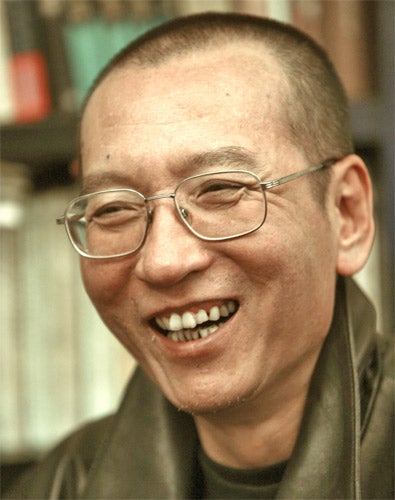China claims victory as 19 countries spurn Nobel ceremony

The extent of China's efforts to belittle the Nobel Peace Prize was fully revealed yesterday when the award's committee announced that 19 of the 65 countries asked to attend Friday's ceremony honouring the jailed dissident Liu Xiaobo had turned down their invitations.
China was furious when the committee awarded the prestigious prize to Mr Liu, who is serving an 11-year prison sentence for subversion. It has worked hard behind the scenes to exert pressure on allies to boycott the ceremony, and yesterday branded the results proof that the award did not have the world's approval.
"You can see that the vast majority of the international community will not attend the ceremony," the Foreign Ministry spokeswoman Jiang Yu said. "We will not change because of wind blowing the grass and because of the interference of clowns who are anti-China."
The Nobel committee in Norway viewed the matter differently, pointing out that only the 65 countries with embassies in Norway were invited, of which 44 accepted, and calling the Chinese view "a curious way of stating things".
The list of non-participants in the 10 December event in Oslo includes embassy representatives from Russia, Pakistan, Serbia, Iran, Venezuela and Cuba. Many of the countries which will not be attending rely on strong diplomatic relations with China. A senior Filipino diplomat told Reuters that its non-attendance was intended to avoid another major spat with China soon after a diplomatic freeze when eight Hong Kong tourists were killed in a Manila bus hijacking in August. "We do not want further to annoy China," the official said.
Some embassies have tried to fudge the issue. The German ambassador is unlikely to attend, but the Berlin government will be represented by a deputy, in what looks like a move to fulfil Germany's diplomatic role but not offend the Chinese government.
The list of participants has been similarly reduced because no one in the Chinese dissident community is allowed to travel. Nobel officials have said that none of Mr Liu's relatives were expected to travel to Oslo to collect the prize on Mr Liu's behalf. But his wife, Liu Xia, had invited scores of activists and luminaries to attend the ceremony in an open letter posted online.
Mr Liu is serving an 11-year sentence on subversion charges brought after he co-authored a bold call for sweeping changes to the one-party communist political system known as Charter 08. His wife has been placed under house arrest, as have numerous lawyers, academics and activists.
Beijing considers Mr Liu's recognition an attack on China's political and legal system, and says the country's policies will not be swayed by outside forces in what it calls "flagrant interference in China's sovereignty".
Only one of about 140 Chinese activists invited by Mr Liu's wife has confirmed he will attend the prize ceremony in the Norwegian capital. Most of the others have been stopped from leaving China or placed under surveillance.
Any lingering doubt over the determination of China's opposition to the award was further dispelled yesterday by the news that Beijing will award its own alternative to the Nobel tomorrow.
Three weeks after the idea was first mooted, China yesterday announced the 'Confucius Peace Prize', founded to "interpret the viewpoints of peace of (the) Chinese (people)." The first honoree was former Taiwanese vice president Lien Chan, for "building a bridge of peace between the mainland and Taiwan."
Join our commenting forum
Join thought-provoking conversations, follow other Independent readers and see their replies
0Comments